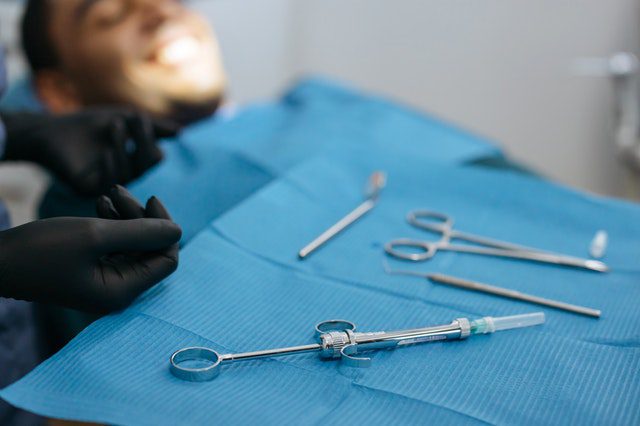Oral surgery can be a necessary and important treatment for a variety of issues affecting the jaw, gums and teeth. However, the prospect of undergoing a surgical procedure can be intimidating, especially if you have never had one before, and even more so if you’ve no idea what you’re getting yourself into.
No worries! We’ve got answers to the most frequently asked questions about oral surgeons and oral surgery. Knowledge is key to feeling more confident and informed about this important aspect of oral healthcare. And if you can’t find the question(s) you’re looking for in this article? Just give our office a call – we’re happy to help answer any questions and dispel lingering worries.
Okay, let’s get going! Here are the 10 most common questions we get asked at Wilmington Oral Surgery:
1. What is an oral surgeon?
This is the big one: what’s different between an oral surgeon and my regular family dentist? A lot of it is focus:
- A dentist performs preventative and mitigative care for general dental issues like cleaning, cavity removal/filling, teeth whitening, exams, and x-rays.
- An oral surgeon is a dental specialist who is trained to diagnose and treat issues involving the mouth, teeth, and jaw.
You visit your dentist twice a year to monitor and optimize the health of your teeth and gums. As well as those yearly x-rays, which can detect any under-the-surface issues. An oral surgeon comes in when, say you need your wisdom teeth removed. Your dentist will refer you to a surgeon who specializes in wisdom tooth extraction.
2. What’s the education needed to become an oral surgeon?
Oral surgeons typically complete a four-year undergraduate degree and then go on to complete a four-year dental degree program. After completing their education, oral surgeons undergo several additional years of training to specialize in surgery. This training includes both didactic coursework and hands-on experience in a clinical setting.
Oral surgeons are trained to perform a wide range of surgical procedures, including tooth extractions, wisdom tooth removal, and corrective jaw surgery. They may also be trained to perform cosmetic procedures, such as jaw reshaping or implant placement.
There are also oral surgeons who do extra training to become maxillofacial surgeons, whose expertise extends to intricate surgeries for jaw, sinus and facial pathologies like cleft palates. Maxillofacial surgeons are able to perform full mouth reconstructions in even the most complicated cases.
3. What kinds of procedures are considered an oral surgery?
Oral surgery refers to a surgical procedure that is performed on your teeth, gums, jaws, and other oral structures. This can include extractions, implants, gum and bone grafts, and jaw surgeries. At Wilmington Oral Surgery, we offer:
- Dental implants
- Surgery for orthodontics
- Pediatric oral surgery
- Wisdom teeth removal
- Laser surgery
- Facial trauma
- Full mouth reconstruction
- Bone grafting
- Dentin grafting
- Soft tissue grafting
4. What are dental implants?
Dental implants are the most holistic way to replace missing teeth in adults. It’s a 2- to 3-piece installation that includes a small post that’s implanted in your jaw at the site of the missing tooth. Later, it’s crowned with a tooth that has the same appearance and bite strength as your natural teeth.
Dental implants are the only way to comprehensively restore missing teeth. Why? Because of that little post. It mimics the stabilizing and stimulating function of a natural tooth root. This preserves the health of your jaw, which would otherwise start to deteriorate if the socket is left empty. They also preserve the alignment of your bite, as an empty socket can allow surrounding teeth to shift and even come loose.
5. What is the process of dental implant surgery like?
Dental implant surgery sounds scary, but we promise it’s not! What the dental implant process most requires is patience from the patient and the oral surgeon.
1. You’ll have an initial consultation with our oral surgeon, Dr. Puckett. He’ll walk you through the process from start to finish, explaining the treatment plan, including how the implant(s) will be placed, surgery process, healing time, etc.
1a. Some patients may need some supplementation to their jaw bone before getting an implant, to assure that the implant surgery is successful. This is a simple procedure that adds time more than anything else. Dr. Puckett will discuss at your consultation whether this is necessary and what the procedure is like.
2. On the day of your implant surgery, you’ll receive anesthesia so that you don’t feel a thing. Our oral surgeon will make a small incision in your gums and install the implant post into your jaw. He may place a dentin graft if he feels it’ll help healing time. We also offer sedation for surgical procedures if you need help staying calm through the procedure.
Remember: You’ll need someone to drive you home after the appointment, so plant with a family member/friend ahead of time.
3. You’ve got a few months to keep good care of the site (and the rest of your mouth!) while we give your jaw time to heal around the implant, integrating it as a replacement tooth root.
4. Once your jaw has integrated the implant post, you’ll come back into the office for the second step of the dental implant process: the abutment. Dr. Puckett will make a small incision where the implant was placed, and screw a little piece onto the top of it. This will eventually serve as the foundation for the tooth crown.
4a. Patients with sufficient jaw and oral health may be eligible for same-day dental implants, where we combine several of these steps into one. It takes weeks off the process and lessens the time you’re without a visible tooth. Dr. Puckett will discuss in your initial consultation whether this is a viable option.
5. Another few weeks to wait while your gum heals around the abutment.
6. On your third visit to our office, you finally get your tooth crown! It will look and act just the same as a natural tooth, having been made custom to match the rest of your mouth. And that’s it! You’ve got a whole new tooth – inside and out.
The dental implant process takes time, but it’ll be worth it, because these prosthetic teeth, when properly cared for, are a permanent solution to reconstructing a smile.
6. What is involved in a wisdom tooth extraction? And why do I need one?
Some people never need to get their wisdom teeth out. Lucky. But for most of us, near the end of high school, our dentist recommended we go to an oral surgeon to have our wisdom teeth extracted. Why? Many of us simply don’t have the room in our mouths. It’s a whole thing – you can read more about wisdom teeth and the human mouth on another of our articles.
Because most of us don’t have room for wisdom teeth to come in properly, leaving them in leaves you open to possible complications like other teeth shifting, coming loose or falling out, infection, abscess, decay, and other problems.
Most often, a wisdom tooth removal is a quick and simple tooth extraction – just below the gums instead of above, which is why recovery takes longer. But if your wisdom tooth roots are complicated or your teeth are impacted, the surgery may be a little more invasive, possible requiring a dental bone graft if the surgeon had to get into the jaw to remove the wisdom teeth roots.
Dr. Puckett will discuss your x-rays and every detail of what your specific wisdom tooth extraction will look like at your initial consultation appointment. For most of our patients, the sedation for the surgery hits them harder than the procedure itself, so don’t forget to bring a designated driver to your wisdom tooth extraction!
7. What is the recovery from an oral surgery like?
Oral Surgeries are typically scheduled for one day and usually take a short time to complete. Others, like full mouth reconstruction or jaw surgery, are more complicated than a simple wisdom tooth extraction or gum graft. You’ll get all the details before you go in – don’t worry.
You might have to stay a few hours afterward to recover from any anesthesia administered. And you’ll need someone to come with you to the appointment who’ll get you home, as for most surgeries you won’t be able to drive after, especially if you had sedation during the procedure.
The recovery process from an oral surgery isn’t too bad. While it normally takes a few weeks to completely heal, the uncomfortable part of the recovery usually lasts only a few days, with the first 2-3 days being the most important for resting.
What’s most important during recovery is to keep up on your aftercare – you need to baby the site for the first couple of weeks. That means no strenuous activity, hard or acidic foods, careful brushing, and completing any antibiotic, homeopathic or topical recovery medications our oral surgeon may have prescribed.
8. Will getting an oral surgery hurt? Will I be awake for the surgery?
No – the surgery itself will not hurt. Anesthetics will be used to numb the area or sedate you during the surgery. Your visit will be customized to help you feel as relaxed and comfortable as possible, which is why we also offer different levels of sedation dentistry for patients who need a little extra help.
Post-surgery, you will most likely experience some pain, soreness and swelling. This is normal for the first few days. However, if you have a lot of nausea, vomiting, fever, excessive bleeding or intense swelling, you should come back into the office, as it may be a sign of an emerging issue that needs taken care of.
9. How do I know if I need an oral surgery?
Most of the time, your dentist will tell you – you need your wisdom teeth out, teeth replaced, receding gums corrected, or your jaw supplemented. However, there may be times when you seek an oral or maxillofacial surgeon out yourself. For instance, jaw deterioration can alter your facial appearance, which may hurt your self-confidence. Consulting an oral surgeon gives you a resource for how to graft or reconstruct your jaw to restore your facial structure.
If you’ve been thinking about restoring your smile, give our office a call to set up a comprehensive consultation with our oral surgeon, Dr. Puckett.
10. Does dental insurance cover oral surgeries?
Most oral surgeries are covered by normal dental or medical insurance plans, however, it can also be dependent on the type of procedure. You can get a pre-estimate for the surgery from your dentist or oral surgeon, and then contact your insurance to get the specifics on what it will or will not cover. Knowing ahead of time will allow you to set up any kind of payment plan if needed.
Our office works closely with your dental insurance to ensure that you get the most out of your plan. We work for you – not your insurer, and patient care is our utmost priority. We also offer simple payment plans for more expensive procedures so you’re not strained financially, because everyone should be able to afford the treatment they need.
What Else to Know About Oral Surgeons & Oral Surgery?
To bring it all together, oral surgeons are highly trained and skilled professionals who specialize in a range of procedures involving the mouth, teeth, and jaw. They are equipped to handle a variety of issues, including wisdom tooth extraction, dental implant surgery, and jaw realignment. There’s a lot to it – but we make sure you’re fully-informed on your options and what’s best for your health and your budget.
If you have any questions or concerns about oral surgery, it is important to consult with a qualified oral surgeon to determine the best course of treatment. Contact Wilmington Oral Surgery if you require an oral procedure; we proudly service the Cincinnati/Dayton area with the best in oral and maxillofacial surgery.









